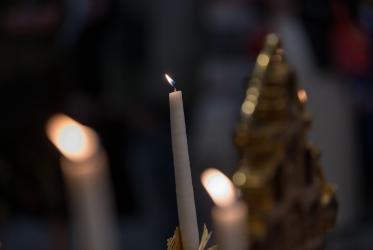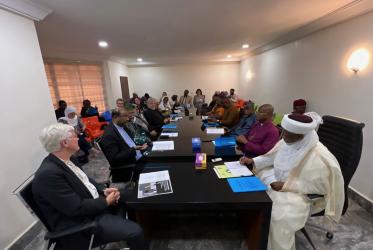Only weeks after the World Council of Churches (WCC) and the Royal Aal Al-Bayt Institute for Islamic Thought joined Nigerian Christians and Muslims to launch the International Centre for Inter-Faith Peace and Harmony (ICIPH), in Kaduna, Nigeria, a dire food crisis calls the attention of churches and partners around the globe.
With 4.5 million people in need of assistance, out of which one million are in danger of extreme malnutrition according to UNICEF, the food crisis currently unfolding in northeastern Nigeria is likely the worst in the world, reports Bloomberg.
A central cause of the crisis in the region, the Independent reports, is the upsurge and ongoing violence perpetuated by the militant group Boko Haram. Since 2009, they report, tens of thousands have died, and millions have been forced to flee their homes. From displacement follows the grim consequence that people can no longer plant their crops, and produce the food they need.
And while the security situation in the northeast appears to be recently somewhat improving, ”the unfolding humanitarian crisis in the region gives no room for complacency”, states Nigeria Mission 21 in an August 2016 report. And in turn, “food insecurity has grave implications for national security,” the report goes on to note.
“The world and Nigeria doesn’t realise how bad this is,” said Arjan de Wagt, UNICEF’s chief of nutrition in Nigeria, in an interview in the Nigerian capital Abuja, on 9 September. “In the area of food nutrition, if you look at the level and the indicators, I’m not aware of anywhere you have this magnitude and this number.”
”In past years, the World Council of Churches has had a sustained and proactive engagement for peace in Nigeria, and a strong Christian commitment to walking together in pastoral solidarity with the people of Nigeria, with those who are suffering, or have suffered, as individuals, as families and as communities,” said WCC general secretary Rev. Dr Olav Fykse Tveit. “I believe any conflict and religiously motivated violence in Nigeria must ultimately be solved by the Nigerian people themselves, but as part of an international community, we must do all we can to offer support to peace efforts in the country.”
”As the gravity of the food crisis now grows, it is our hope that together, through the work of the new peace-centre, our partners and not least the network of the ACT Alliance, we can reach out as communities of faith, raise awareness of the situation in Nigeria, and help alleviate the suffering of those who are hungry,” Tveit added.
Nigerian Christians and Muslims open historic peace centre (WCC press release of 20 August 2016)
Full speech by Rev. Dr Olav Fykse Tveit at launch of historic peace centre, Kaduna, 19 August 2016





